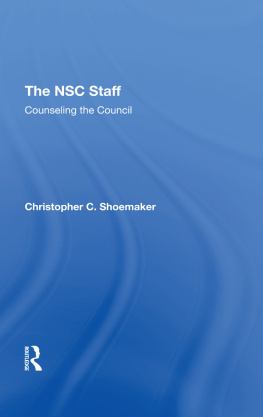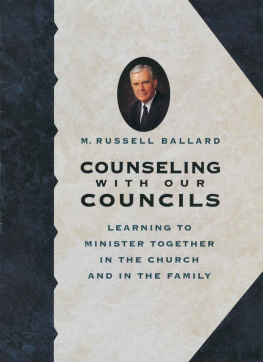To Terri
First published 1991 by Westview Press
Published 2019 by Routledge
52 Vanderbilt Avenue, New York, NY 10017
2 Park Square, Milton Park, Abingdon, Oxon OX14 4RN
Routledge is an imprint of the Taylor & Francis Group, an informa business
Copyright 1991 by Taylor & Francis
All rights reserved. No part of this book may be reprinted or reproduced or utilised in any form or by any electronic, mechanical, or other means, now known or hereafter invented, including photocopying and recording, or in any information storage or retrieval system, without permission in writing from the publishers.
Notice:
Product or corporate names may be trademarks or registered trademarks, and are used only for identification and explanation without intent to infringe.
Library of Congress Cataloging-in-Publication Data
Shoemaker, Christopher C.
The NSC staff: counseling the council / Christopher Shoemaker.
p. cm.
Includes bibliographical references (p. ) and index.
1. National Security Council (U.S.). 2. United StatesNational
security. I. Title.
UA23.15.S49 1991
353.0089dc20
90-12508
CIP
ISBN 13: 978-0-367-29448-9 (hbk)
The management of national security has long presented a governmental and organizational dilemma of the first order. As we look at the nature of the international environment, there is no cause to believe that this dilemma will become any less pronounced in the future. The demands of national security and the accelerating rate at which decisions must be made argue for the development and implementation of the most effective management system possible.
The U.S. constitutional framework provides remarkably little guidance to a president in constructing a system for making national security policy. In fact, each president must invent his own system. Some, like Franklin Roosevelt and John Kennedy, have used informal groups of trusted advisers; others, like Harry Truman and Gerald Ford, have delegated policy-making to the secretary of state; still others, like Dwight Eisenhower, Richard Nixon, and Jimmy Carter, have centralized policy-making procedures within the White House, with the National Security Council apparatus assuming a vital organizing and coordinating role. Problems, such as the Iran-Contra affair, have often developed when a president has failed to provide clear lines of authority for the policy-making process.
In this book, Christopher C. Shoemaker comes to grips with this daunting issue as few other authors have. His analysis and his prescriptions are based on a realistic assessment of the complexity of national security and of the inadequacy of past systems in dealing with the issues in a systematic fashion. Of special importance is the need to refine and articulate the role of the National Security Council Staff along the lines proposed in this book. The NSC Staff must again become the focal point of the national security structure, with the presidential imprimatur necessary to make the system effective.
This is a book of significant value to both students and practitioners of national security. Students will benefit by seeing the practical dimensions of the NSC, and those charged with the management of national security should consider seriously the structural recommendations. It is a rare combination of intellectual insight and practical utility and contributes in a substantial way to the study of decision-making at the highest levels.
Zbigniew Brzezinski
On November 3, 1986, the Beirut newsmagazine Al Shiraa reported that the United States had been secretly selling weapons to Iran, notwithstanding a formal arms embargo that had been in effect since the Tehran embassy seizure seven years before. This story was the tip of a policy and procedural iceberg that, when fully surfaced, would precipitate a major crisis for the Reagan administration. As the details of the issue were gradually revealed, it became apparent that, apart from raising serious questions of judgment, the Iran-Contra affair demonstrated some major problems within the National Security Council Staff, problems that called into question the very nature and function of that organization. For the first time in its often controversial history, the NSC Staff was subjected to serious public scrutiny, and calls for major reform arose from many quarters. Even those favorably disposed toward the administration began to ask how one small staff could wield so much power, even in the face of what was apparently determined opposition from the Department of State and the Department of Defense. For students and practitioners of national security policy, the fundamental procedural and structural questions posed in the wake of the Iran-Contra affair warrant serious attention.
Since its inception in 1947, the National Security Council Staff has assumed an increasingly significant role in the formulation of national security policy in the United States. What began as essentially an administrative and clerical support group for the National Security Council has evolved into what, without exaggeration, has become the single most powerful staff in Washington, eclipsing other departmental staffs which, by statute and custom, should have been dominant in their respective fields. This rise in power has been most often ascribed to the powerful personalities who have headed the NSC Staff. However, personalities, even those as strong as Zbigniew Brzezinski and Henry Kissinger, do not alone explain the remarkable bureaucratic clout of the NSC Staff. Indeed, during the Iran-Contra affair, the NSC Staff was headed by persons not noted for personal flair.
In order to understand the sources and implications of NSC Staff power, it is necessary to look beyond personalities and examine the functional roles played by the Staff as an institution. Only then does it become apparent that, regardless of the strengths or weaknesses of the members of the National Security Council, the NSC Staff will continue to play a dominant role in the formulation of national security policy into the next century.
What follows is an effort to outline the functional requirements of the NSC Staff, identify certain features of NSC Staff decision-making, examine the international and domestic environments in which national security is embedded, and propose a structure by which the NSC Staff could more effectively execute its various functions. Such an examination is important for heuristic as well as pragmatic reasons. From a scholarly perspective, much has been written about decision-making within the immediate circle of the president. Such accounts have ranged from the theoretical to the anecdotal. There is room, however, for a more rigorous look at the role of the NSC Staff-a look that will help modify or amplify some extant wisdom on the subject. From a policy perspective, a more thorough understanding of the functional requirements of the NSC Staff can help a new administration avoid replowing old ground and taking years to discover what its predecessors already learned by trial and error. To the extent that this effort succeeds in these objectives, it will be useful.
1
The Rise of the NSC
An in-depth look at the National Security Council Staff must begin with a review of the concept of national security itself as well as a discussion of the formation and evolution of the NSC as an institution. For in its roots we find both the underlying rationale that commands its existence today and the deeply ingrained issues of departmental responsibilities and jealousies that determine its course. As we trace the history of the NSC and examine the different approaches that eight presidents have adopted toward national security decision-making, two trends will become apparent. First, the role of the NSC itself is highly dependent upon the psychological makeup of the president in office. Second, the NSC Staff has inexorably emerged as a primary actor in national security, largely independent of the presidents use of the NSC itself as a decisional body.












